Real Men Wear Pink because we all have a part in Breast Cancer Awareness Month
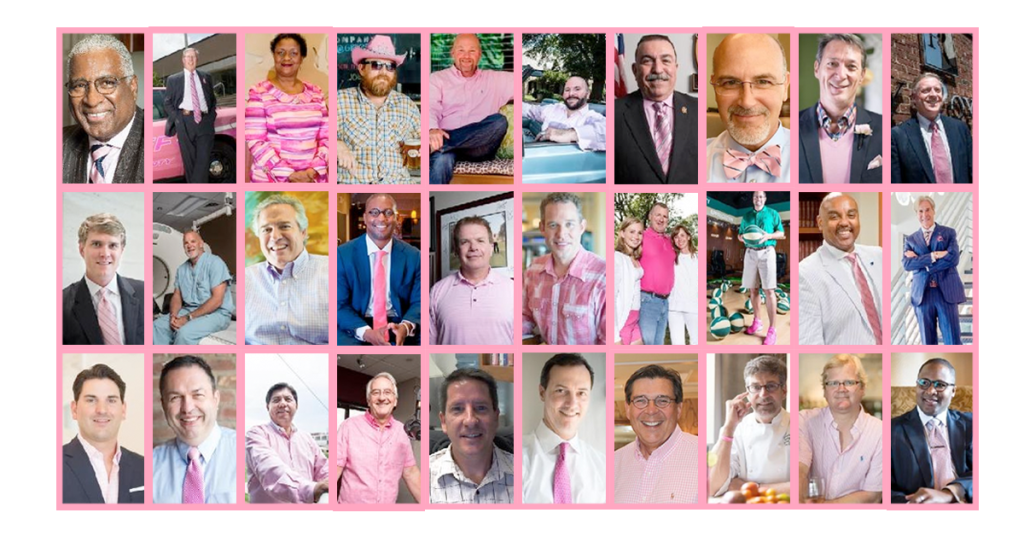
In case you’ve been living under a rock and have missed all the pink, October is Breast Cancer Awareness month. There are events, runs, and fundraising efforts like the Real Men Wear Pink campaign happening not just throughout Alabama but across the nation. I’ve always been a little skeptical of the need for the in-your-face-style campaigns that seem more geared toward keeping public relation firms in business than to actual prevention or information, but this year that has changed. First the first time I get it. I’m joining the masses to promote awareness. No, that doesn’t mean I’ll be donning pink every day for the rest of the month, it means I’ll have real and honest discussions with my girlfriends about cancer. Until this year, I knew nothing about breast cancer. Last Christmas a relatively new friend, Ronda Walker, was diagnosed with the disease and I began following her journey to kicking cancer’s butt. If you haven’t read Ronda’s personal blog “Merry Christmas Cancer,” you’re missing out on one of the most uplifting and spirited women I’ve ever met. She’s penned some amazing content for our site too (like this post about Daughters Day). Beyond Ronda’s personal struggle with breast cancer it seems more people than I realized have been touched by the disease. In Jefferson County, Commissioner Sandra Little Brown frequently speaks of the struggle she faced fighting her own battle with cancer. In a recent interview with Over the Mountain Journal, Little Brown said, “I wish that everybody that went through what I went through could have that support that I had to help pull me through. I want to be able to give that same support to other women who are affected by this disease. One out of 8 women are and that’s too many.” Most recently David Magee, senior director of content for Alabama Media Group – a man (yes, you read that correctly) who I’ve met several times and who has a storied career in journalism, books and radio – posted on AL.Com that he too has recently been diagnosed with breast cancer. Reminding us amid the flurry of pink that men too have have a place in both education and awareness. Knowing friends affected, reading the statistics, and wearing a pink ribbon, however, doesn’t make us any more aware. I hope you take a moment to research the disease and talk to those you know who have or continue to be affected with it. Check out Cancer.org and look into your local chapter of the Cancer Society, The Birmingham Chapter, who are doing great things. In closing, I’ll leave you with this line from Ronda’s post from last week, I couldn’t say it any better myself: The problem: the misnomer of awareness. October became breast cancer awareness month in 1985 – 30 years ago – so it stands to reason we should all know a lot about the disease, right? Wrong! Wearing pink doesn’t make you aware of the reality of breast cancer any more than wearing a jersey makes you a football player. As I sit here in the midst of my breast cancer fight, I am astounded at all I did not know about breast cancer this time last year. By mid-October last year I was tired of seeing all of the pink, I was tired of hearing about mammograms, I was ready to move on to November. Little did I know at the time breast cancer was growing like wildfire in my body, spreading into my lymphatic system, ready to kill me. I was 42 years old when I was diagnosed and in spite of the 30-year-long awareness push I actually knew very little about breast cancer. From someone who has been in the game – who had her butt singed by the fires of hell and lived to tell about it – please let me make you a little more aware about breast cancer.
Small-dollar donors flock to Donald Trump, help power his campaign
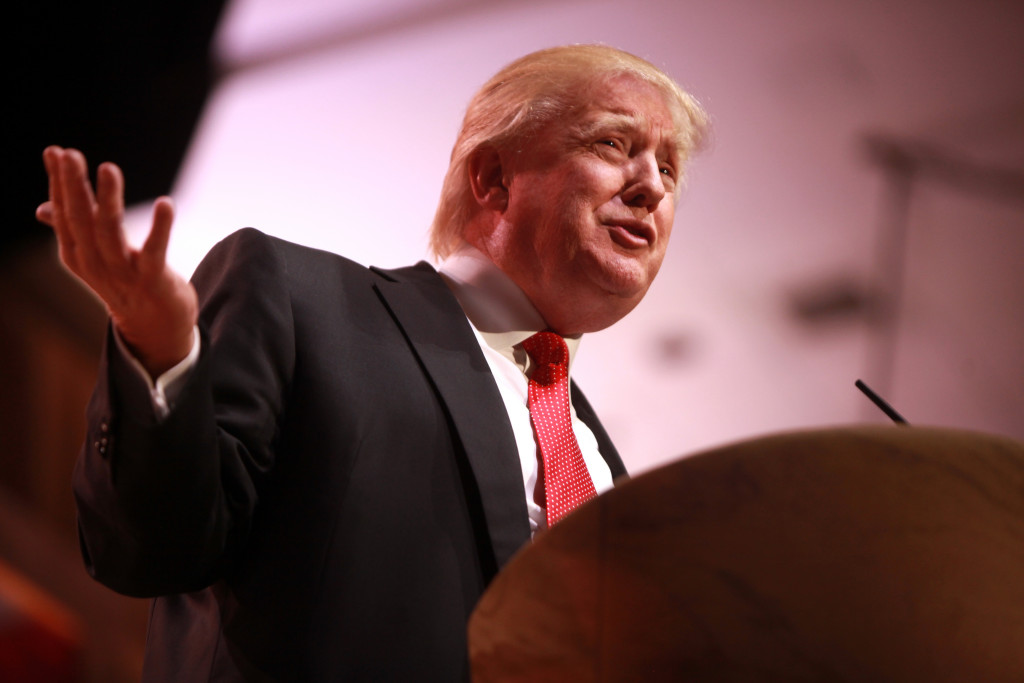
Donald Trump likes to boast about his enormous wealth and how he doesn’t need anyone else’s money to pay for his presidential campaign. That hasn’t stopped tens of thousands of people from chipping in with checks as small as $10 to let the Republican candidate know they’re behind him. Trump has taken in 73,942 contributions, a total that surpasses several of GOP rivals, despite the billionaire businessman’s early pledge to finance his own campaign. Financial reports filed last week also show that more than 70 percent of the $3.9 million he raised from July through September came from people giving $200 or less. That rate of small-donor contributions is second only to Vermont Sen. Bernie Sanders, who’s in the Democratic race. The average Trump contribution was $50.46, his campaign said. The contributors are in small towns, suburbs and big cities. He’s raised money from hundreds of retirees, ranchers, dentists, physicians, real estate executives and financial consultants. For Ansley Pascoli, 64, a retiree in Sandy Springs, Georgia, the money is intended as a symbol of support. She gave the Trump campaign $25 and bought several hats and T-shirts, one of which she was wearing Friday. “One of my reasons for wanting to support him is that even though I know that he does have a lot of money, I don’t feel that it’s right for him to have to bear the burden,” she said in a telephone interview when asked why she was giving money to someone who has bragged about not needing campaign cash. “And even though my contribution was small, I want him to have the feeling that there are other people that are behind him,” she said. It was a sentiment expressed by many of those who appear on Trump’s contributor list and is evidence of the passion he has elicited from voters angry over the country’s direction and craving a political outsider. Pascoli said she was drawn to Trump because of his hard-line stance on immigration, his business background and the fact he’s not a product of the political system. “I really think we are in a pivotal time for the country and we need somebody who has the type of skill set that he has,” she said. Stephan Robinson, a commercial real estate broker in Pearland, Texas, said he contributed $250 because he felt an obligation to help. “If you support a candidate, it shouldn’t matter how much money he’s got,” Robinson said. “He shouldn’t have to spend all his money.” Robinson went on: “I know he doesn’t need my money and the little bit of money I’ve sent, it’s not going to make a big difference. But I just feel in good conscience, that if you support somebody, you should contribute to help offset some of his costs.” Robinson also offered to volunteer and provide office space if the campaign wants to come to town. He’s given money to another Republican in the race: Texas Sen. Ted Cruz. Illinois retiree Beverly Perlson, who’s from a military family, said she was immediately drawn to Trump because of his attention to veterans’ issues and his promise to overhaul the Department of Veterans Affairs. The first time she heard him speak about the issue, she said, “I absolutely fell in love with Donald Trump at that moment.” Her recent $100 contribution was intended to say thank you. “My heart rejoiced because he’s honestly the first person who stood up for our troops, our veterans,” she said. While Trump originally denounced the idea of contributions, he appeared to warm to the idea over the summer. His campaign now makes it easy to give, with a prominent “Donate” button on his website. The site also offers an online store full of campaign gear, such as $30 hats with Trump’s “Make America Great Again” slogan and $50 sweatshirts. The latest filings show that the vast majority of Trump’s campaign expenses in the last quarter were financed by contributions, not by Trump himself. Trump’s campaign manager Corey Lewandowski said in August that the campaign had received tens of thousands in small-dollar donations, but contributions would remain “a very small portion” of the campaign’s funding. He did not respond to questions Friday about the extent to which the campaign’s calculus had changed. Many of the logged contributions reflect purchases from the website. Elle Koch, a semiretired business owner from Cincinnati, Ohio, made a hooded sweatshirt and bumper sticker purchase. Koch, a frequent phone-banker, would like an eventual role with the campaign. She said she wasn’t surprised by the large number of contributions. “This is one of the things you can do right now to show your support,” she said. Republished with permission of The Associated Press.
U.S. House of Representatives: Oct. 19 – Oct. 23
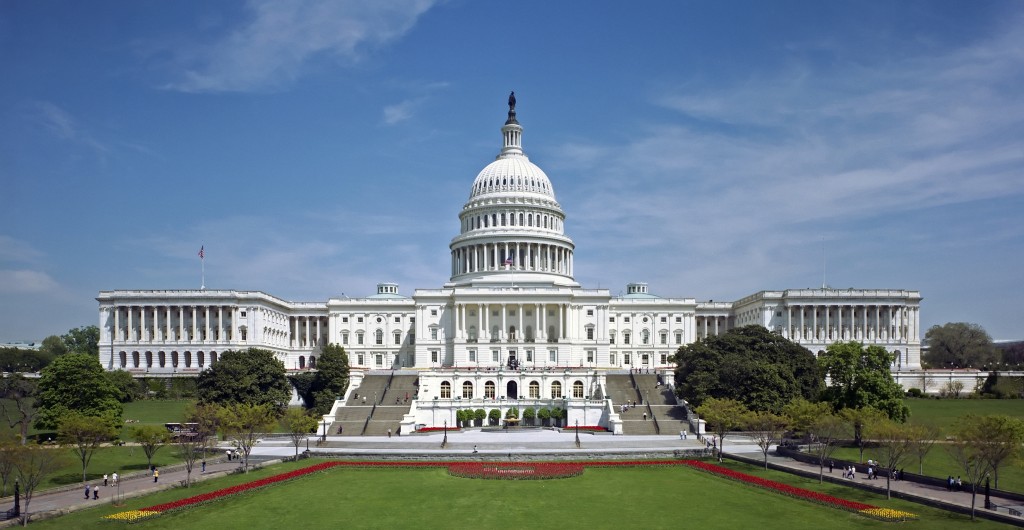
It’s another chaotic week in the U.S. House of Representatives as there are three major developments to follow: After months of anticipation, Democratic presidential frontrunner Hillary Clinton will testify before the House Select Committee on Benghazi that is investigating the 2012 terrorist attacks in Benghazi, Libya on Thursday. The Republican caucus continues to struggle to fill the vacancy being left by Rep. John Boehner for the next Speaker of the House. Many Republicans hope Rep. Paul Ryan — the House Ways and Means Committee Chairman and the GOP’s 2012 vice presidential nominee — will step up and seek the gavel, but thus far he has not expressed interest in the position. The contentious debt ceiling debate continues as only 10 working days remain for lawmakers to come up with a plan to raise the limit by November 3 or risk America’s first-ever default, which could have catastrophic, global consequences. The House returns to session Tuesday and will consider several bills under suspension of the rules. A full list of bills can be found here. The remainder of the week the House will consider: H.R. 692, the Default Prevention Act. The bill allows protects the full faith and credit of the United States by guaranteeing that the Treasury department will continue paying off debt in the event the debt ceiling is reached. Alabama co-sponsors: Rep. Martha Roby (AL-02), Rep. Mo Brooks (AL-05), Rep. Gary Palmer (AL-06) H.R. 10, the Scholarships for Opportunity and Results Reauthorization Act. The bill is a legacy piece of legislation for outgoing Speaker John Boehner (R-OH). It reauthorizes the D.C. Opportunity Scholarship (voucher) Program for an additional five years, through FY 2021, under which federal funding is provided to eligible students in Washington, D.C., to allow them to attend private schools. It also updates the program to provide for greater student participation and to mandate greater accountability by the private schools that participate in the program. H.R. 1937, the National Strategic and Critical Minerals Production Act. The bill classifies domestic mining operations for strategic and critical minerals on federal lands as “infrastructure projects” in order to take advantage of a 2012 presidential order to federal agencies that eases the permitting process for infrastructure projects. H.R. 3762, Restoring Americans’ Healthcare Freedom Reconciliation Act. The bill is a consolidated bill from provisions reported by three different House committees that repeals several elements of Obamacare including the individual mandate, the employer mandates, the Independent Payment Advisory Board (IPAB), the medical device tax, and the “Cadillac” tax. The bill also blocks federal funding for Planned Parenthood for one year. Because the legislation was developed under reconciliation instructions included in the FY 2016 budget resolution, it will be protected from filibuster in the Senate and can be passed there by a simple majority.
Presidential Primary Brief: 386 days until Election Day
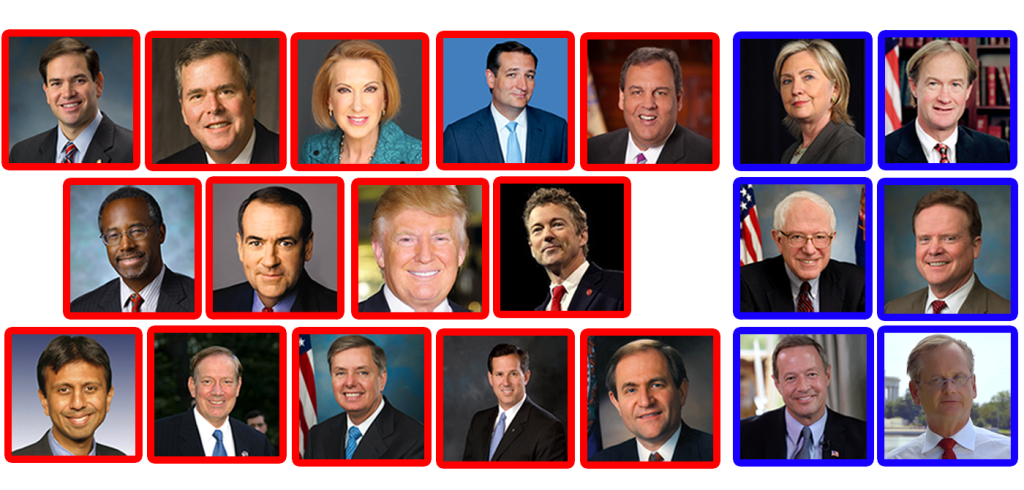
132 days until AL Presidential Primary 386 days until Election Day Convention Dates: Republican July 18-21 2016, Democratic July 25-28 2016 Weekly Headlines: Democratic debate: Fact-checking the candidates Poll: Donald Trump still leads, Ben Carson in second Joe Biden camp to allies: Be ready Press Clips: Everyone but Jim Webb says Black Lives Matter (The Daily Beast 10/14/15) At Tuesday’s CNN debate, the Democrats all endorsed the movement, with Sanders invoking Sandra Bland and Clinton pushing for criminal justice reform. Only Jim Webb refused to go along. Every Democratic candidate on the CNN debate stage Tuesday night made it clear they support the Black Lives Matter movement—except rogue militaristic outsider Jim Webb. Bernie Sanders, a noted supporter of the group’s message who has met with its activists, got the question first. “Do black lives matter, or do all lives matter? Let’s put that question to Senator Sanders,” a bespectacled Anderson Cooper asked. Clinton and Sanders seriously out-‐fundraised GOP candidates, minus super PACs (The Week 10/16/15) Thursday night was the deadline for 2016 presidential candidates to file their Federal Election Commission Financial reports for the last quarter, and the big takeaway is that the two leading Democrats are crushing the Republican field in direct campaign contributions. The six Democrats who filed raised a combined $123.2 million from July 1 through Sept. 30, while the 15 Republican candidates raised a combined $143.5 million. Amid overall high spending, the cash-on-hand numbers are even more telling: Hillary Clinton and Sen. Bernie Sanders (I-Vt.) start the fall with $60.1 million in their coffers, only slightly less than the $61.2 million for all 15 Republicans. Averse to fundraising, Donald Trump still rakes in millions (CBS News 10/16/15) Can it be simultaneously true that Republican presidential candidate Donald Trump swears off traditional campaign fundraising while still raking in a substantial sum of money from private contributions? The answer appears to be a resounding yes: on Thursday, Trump’s campaign announced that it raised $3.9 million between July and September this year. The figure came as a surprise to some, given Trump’s oft-expressed aversion to the kind of donor-courting in which other candidates engage. RNC Chair: GOP ‘Cooked as a party’ if we don’t win 2016 election (TPM 10/16/15) Republican National Committee Chair Reince Priebus said on Thursday that the 2016 presidential election will make or break the party. In an interview published early Friday morning, he told the Washington Examiner that even during a presidential election year, the RNC is still responsible for supporting House and Senate candidates. “However, I think that we have become, unfortunately, a midterm party that doesn’t lose and a presidential party that’s had a really hard time winning,” Priebus told the Examiner. “We’re seeing more and more that if you don’t hold the White House, it’s very difficult to govern in this country — especially in Washington D.C.” John Kasich outlines broad economic agenda in New Hampshire (NBC News 10/15/15) Presidential hopeful John Kasich outlined his economic agenda in front of a crowd of students at Nashua Community College, pledging to balance the federal budget in eight years and transfer many responsibilities of the Department of Education and Department of Transportation to the states. The underlying message: Believe him because he has done it before. Standing to the side of a giant ticking clock showing the pace of the rising national debt, the Republican governor of Ohio proposed that as president, he would “immediately” put the nation on a path to a balanced budget, and would accomplish it within eight years. And he promised to work with Congress and the states to pass a constitutional amendment requiring a balanced budget. Jeb Bush weighs in on Afghan strategy, Donald Trump (CBS News 10/16/15) A day after President Obama announced that he would slow U.S. plans to withdraw its troops from Afghanistan, Republican presidential contender Jeb Bush announced his support for the strategy. “I would take the recommendation of the general that was responsible for it, who’s now the chairman of the joint chiefs: 10,000 troops,” Bush said. “I think that’s the proper place to be-without a timeline. Because the minute you create a timeline… your opponents, your enemies are organizing for, waiting you out. And I think that’s the proper thing to do.” Mr. Obama announced Thursday that the U.S. would continue to keep its 9,800 troops in the country through the majority of 2016, reducing that number to about 6,000 forces after 2016. How Ben Carson transformed from doctor to 2016 presidential candidate (USA Today 10/12/15) In early 2013, Ben Carson was largely known as a best-selling author, a celebrated pediatric neurosurgeon and subject of a television movie starring Cuba Gooding Jr. It was a compelling narrative: a boy brought up in poverty on the southwest side of Detroit by a single mother; a lousy student with a bad temper who turned it around to graduate from Yale, get a medical degree from the University of Michigan and become the youngest doctor, at the age of 33, to head a surgical division at Johns Hopkins Hospital in Baltimore. Hundreds of Obama bundlers missing from Clinton’s elite fundraising ranks (USA Today 10/18/15) Hundreds of wealthy Democrats who raised money for President Obama’s re-election have not yet joined the top fundraising ranks of Hillary Clinton’s presidential campaign, raising hopes among some of Vice President Joe Biden’s supporters that there remains a path for his late entry into the race. Just 76, or less than 10 percent, of the 833 individuals who collected political cash for the 2012 Obama-Biden campaign are listed among Clinton’s “Hillblazers,” her campaign’s designation for people who already have bundled together at least $100,000 on her behalf, a USA TODAY analysis of Clinton’s newly updated fundraiser list shows. When Donald Trump quits (Politico 10/18/15) After sending mixed signals about what might drive him to withdraw from the presidential race, Donald Trump settled on a definitive answer last month: “I’m never dropping out.” The next day, he tweeted, “I’m leading big in every poll and we
Jim Zeigler: Gumption – How to still make a difference despite Montgomery circumstances
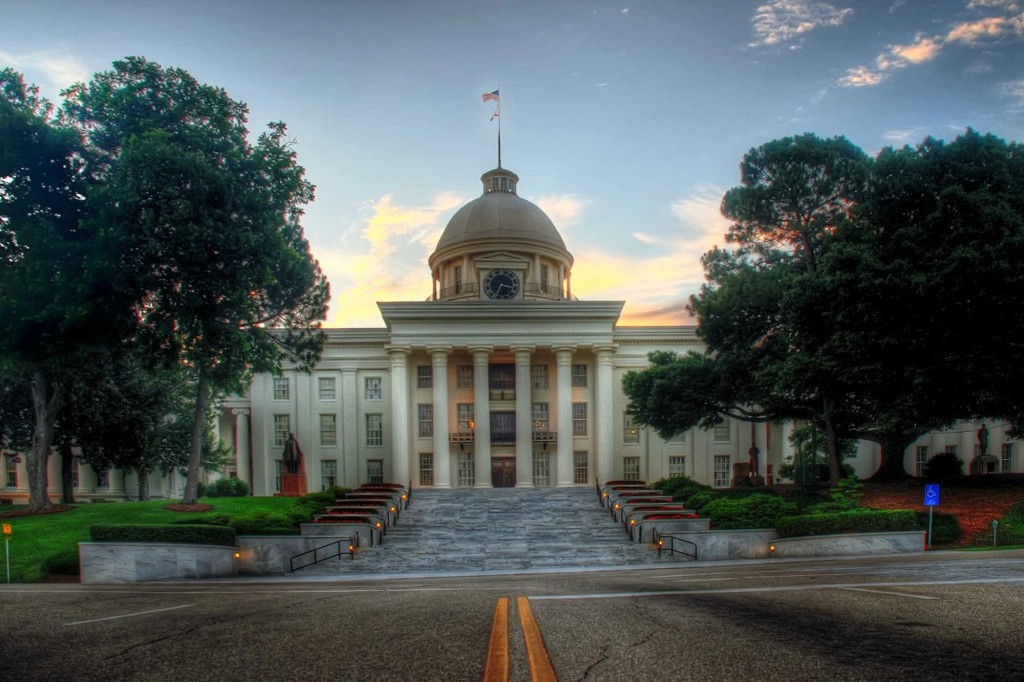
When I became your State auditor nine months ago, I discovered obstacles to my plans for better accountability of how state government uses your money. Here are five: No accountability for missing state property. When the auditor’s office completes an audit of a state agency and reports missing property, there is no accountability. No recovery. No enforcement. The auditor’s office itself has no enforcement authority. Sadly, we are dependent on the attorney general’s office for enforcement. We send a copy of the report of missing property to the AG, never to be heard from again. The AG takes no action against the state officials responsible for the missing property. Looking back over five years of state auditor reports, it appears that the AG has never held a single person accountable and has never recovered even one item of state property. This is a major flaw in the state auditing process. Maybe I should have run for AG. The Governor does almost the opposite of what he campaigned on. Gov. Robert Bentley campaigned for re-election on “no new taxes.” Within days after winning the November general election, he started talking about needing new taxes. He passed three new taxes but is still asking for more, much more. He had said he was against the liberal Common Core in our education system, but he has not taken any steps to repeal it. He had said he would not allow ALDOT to harm the historical North Eufaula Avenue median where the treasured antebellum homes are. Within days of winning re-election, he and ALDOT decided to four-lane North Eufaula Avenue, taking 6 feet along the median and likely killing the oak trees. The Governor is cut off by a circle of advisers – bad advisers. Gov. Bentley does not listen to you, and he does not listen to me. He listens to a group of staff, supporters, lobbyists and special interest politicos. They have him surrounded and cut off from the normal people. The Bentley bunch are the sorriest, know-it-all, self-serving, we-know-best mafia he could assemble. We would all be much better off he would fire the whole bunch, go out to Wal-Mart, and hire the first five people to come out of Wal-Mart. I would have to operate the state auditor’s office with no receptionist, no secretary, no investigator and no lawyer. My assistant Hope Curry, the professional auditing staff, and I are getting the job done despite no receptionist, secretary, investigator or lawyer. Our audits are all current. We have improved the auditing system and completed audits of 68 state agencies already. Even after starting with this bare-bones operation, we suffered another 25 percent cut in our budget, about double the cuts to other agencies. I think I may have irritated some folks on Goat Hill. A problem with my favorite restaurants in Montgomery. After I won the election last year, I told a friend in Montgomery that I was looking forward to coming back there and enjoying my old favorite restaurants. The Elite. The Sahara. The Red Bird Inn. The Green Lantern. The Pub at Montgomery Mall. Two Sisters. Joe’s Delicatessen on Fairview. TP Crockmier’s. Igor’s. Charlie’s. The Capitol Grill. The Beverly. My friend replied that I was going to be disappointed – they are all closed. Without my patronage, they all went under. I actually have been surprised to learn lots of other things in my nine months as state auditor – mostly adversities. Maybe I should write a book, “Gumption: How to Still Make a Difference Despite Montgomery Circumstances.” Jim Zeigler is the Alabama State Auditor. You can follow him on his Facebook page Zeigler “Waste Cutter”.
6 Republican 2016 hopefuls woo faithful at Texas megachurch
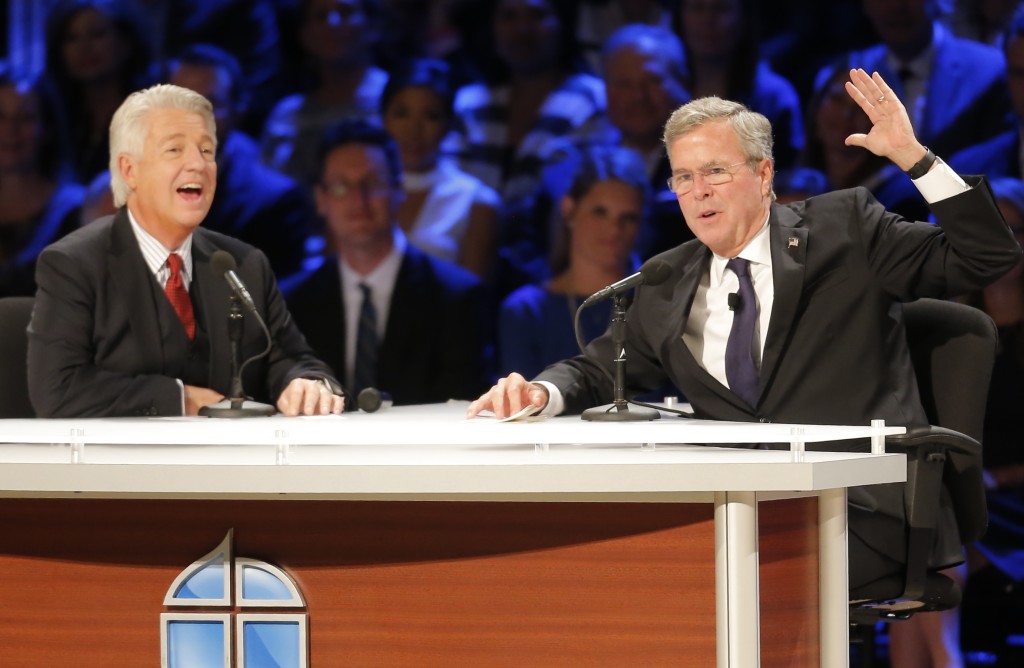
A half-dozen Republican presidential hopefuls worked to woo thousands of evangelicals at a Texas megachurch in suburban Dallas on Sunday, declaring their unwavering support for “religious liberty” even after the U.S. Supreme Court legalized gay marriage and their defense of life in abortion cases and beyond. Some of those making personal appeals – Sen. Ted Cruz, retired neurosurgeon Ben Carson, former Sen. Rick Santorum of Pennsylvania and former Arkansas Gov. Mike Huckabee – are already darlings of Christian conservatives. Former Florida Gov. Jeb Bush and ex Hewlett-Packard CEO Carly Fiorina, meanwhile, might like to be. But the four-plus-hour event before what organizers said was a crowd of 7,000 at the Prestonwood Baptist Church in Plano underscored the importance of the religious right, as well as the potentially pivotal role Texas’ earlier-than-usual primary could play in the 2016 race. Prestonwood claims nearly 40,000 members over multiple Dallas-area campuses. “I’m trying to separate church and politics, but Hillary Clinton said people of faith, ‘Just have to get over it,’” Bush said. “That’s just wrong.” Not attending was GOP front-runner Donald Trump. “Everyone was invited to come but we believe the right people are in the room today,” said Pastor Jack Graham, who interviewed all the candidates about the importance of faith in their lives. He identified those gathered as evangelicals whom he called “Christians who believe the Bible.” Santorum subsequently declared himself an “evangelical Catholic.” Responding to questions about his church’s nonprofit status perhaps being violated because the event was political, Graham said that Democratic presidential hopefuls were also invited — but didn’t appear. Carson declared, “It’s time for us to bring God back to our country,” bringing the crowd to its feet despite his self-admitted “calm demeanor that people mistake as softness.” “It’s not softness; it’s just the ability to look at things from multiple perspectives without getting angry about it,” Carson clarified, saying God gave him the ability to do so. Cruz said faith in America “was under assault,” prompting some in the sprawling, stadium-style sanctuary to bellow “Yes!” He pointed to the Supreme Court ruling on gay marriage, and to businesses that he said had faced boycotts because they opposed same-sex weddings on religious grounds. “I believe that 2016 is going to be a religious-liberty election,” Cruz said to raucous applause. “As these threats grow darker and darker and darker, they are waking people up here in Texas and all across this country.” Fiorina was more subdued, saying her faith was once “a little abstract” since “I came to think of God as a CEO of a big enterprise. He was in charge, but he couldn’t possibly know every little detail.” But, she told the faithful, she later discovered that “each one of us can have a personal relationship with Jesus Christ.” “God knows what’s going on in our lives,” she said, “and that personal relationship saw me through many hard times.” All candidates decried abortion. But Bush highlighted what he called his record of “defense of life” while governor, reminding the crowd that he intervened in the case of Terri Schiavo, a brain-damaged Florida woman at the center of a protracted court fight over having her feeding tube removed. “I didn’t talk about it,” Bush said. “I got to act.” Grassroots groups in Tea Party-dominated Texas largely have shunned Bush in favor of insurgent candidates like Cruz or Trump, but Bush has courted Christian conservatives at many events across the country organized by the Faith and Freedom Coalition, which also helped put together Sunday’s gathering. Bush spoke last and some streamed for the exits as he took the stage — after sitting through hours of candidates and intermissions featuring gospel music and a choir rendition of “America the Beautiful.” The Plano forum also offered presidential hopefuls a chance to make inroads in Texas, the country’s largest conservative state. Officials moved the presidential primary up from May to March 1, and Texas is now set to be the largest of 13 states voting on “Super Tuesday.” Bush was born in the oil-patch town of Midland, his brother George W. was Texas governor before he was president and his father, George H.W., lives in Houston. Graham declared, “Welcome to Bush country.” Bush smiled and replied, “Is that named after my brother or my dad?” Reprinted with permission of The Associated Press.


